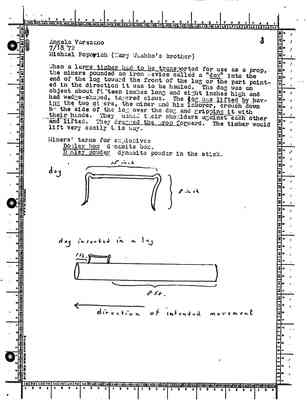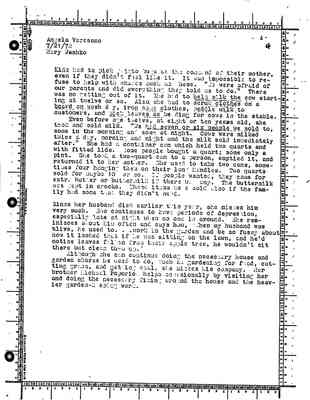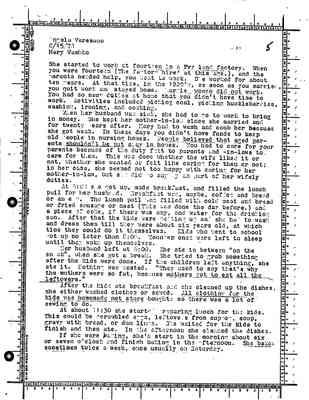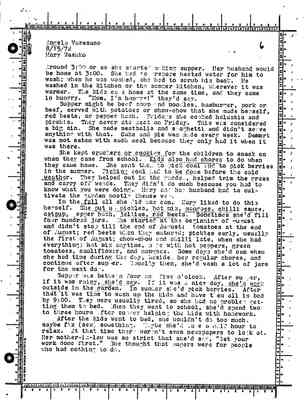Pages
25
Angela Varesano 6/21/72 Mrs. John Washko
The Casagada /Kasagada/ boarding house was described by Mrs. Gyurko as made out of logs. She remembers that it was on a black coal dirt area behind Eckley on the north side. It had flowers around it; it was made like a long building.
26
Angela Varesano 3 7/18/72 Michael Popovich (Mary Washko's brother)
When a large timber had to be trasported for use as a prop, the miners pounded an iron device called a "dog" into the end of the log toward the front of the log or the part pointing in the direction it was to be hauled. The dog was an object about fifteen inches long and eight inches high and had wedge-shaped, tampered claws. The log was lifted by having the two miners, the miner and his laborer, crouch down by the side of the log over the dog and gripping it was thier hands. They used their shoulders against each other and lifted. They dragged the prop forward. The timber would lift very easily this way.
Miner's terms for explosives Dooley box dynamite box. Dooley powder dynamite powder in the stick.
[illustration of a dog as described above] [illustration of a dog inserted in a log]
27
Angela Varesano 7/21/72 Mary Washko
Kids had to pick potato bugs at the command of their mother, even if they didn't feel like it. It was impossible to refuse to help with chores such as these. "We were afraid of our parents and did everything they told us to do." There was no getting out of it. She had to help milk the cow starting at twelve or so. Also, she had to scrub clothes on a board on wash day, iron some clothes, pedole milk to customers, and pick leaves as bedding for cows in the stable. Even before age twelve, at eight or ten years old, she took and sold milk. "We had seven or six people we sold to, some in the morning and some at night. Cows were milked twice a day, morning and night and the milk sold immediately after." She had a container can which held two quarts and with fitted lids. Some people bought a quart; some only a pint. She took a two-quart can to a person, emptied it, and returned it to her mother. She used to take two cans, sometimes four hanging them on their long handles. Two quarts sold for maybe 10 or so. If people wanted, they came for extra butter or buttermilk if there was any. The buttermilk was kept in crocks. These items were sold also if the family had some that they didn't need.
Since her husband died earlier this year, she misses him very much. She continues to have periods of depression, especially late at night when no one is around. She reminisces about him often and says how, When my husband was alive, he used to...work in the garden and be so fussy about how it looked that if he was sitting on the lawn, and he'd notice leaves fallen from their apple tree, he wouldn't sit there but clean them up. Although she can continue doing the necessary house and garden chores he used to do, such as gardening for food, cutting grass, and getting coal, she misses his company. Her brother Richard Poporic helps occasionally be visiting her and doing the necessary fixing around the house and the heavier garden-keeping work.
28
Angela Varesano 8/15/72 Mary Washko
She started to work at fourteen in a Freeland factory. When you were fourteen (The factory hired at this age.), and the parents needed help, you went to work. She worked for about ten years. At that time, in the 1920's, as soon as you married you quit work and stayed home. Married women did not work. You had so many duties at home that you didn't have time to work. Activities included picking coal, picking huckleberries, washing, ironing, and cooking. When her husband was sick, she had to go to work to bring in money. She kept her mother-in-law since she married and for twenty years after. Mary had to wash and comb her because she got weak. In these days you didn't have funds to keep old people in nursing homes. People believed that aged parents shouldn't be put away in homes. You had to care for your parents because of the duty felt to parents and -in-laws to care for them. This was done whether the wife liked them or not; in her case, she seemed not too happy with caring for her mother-in-law, but she did so anyway as part of her wifely duties. At 5:00 she got up, made breakfast, and filled the lunch pail for her husband. Breakfast was, maybe, coffee and bread or an egg. The lunch pail was filled with cold meat and bread or fried sausage or meat (This was done the day before.) and a piece of cake, if there was any, and water for the drinking can. After that the kids were getting up and she had to wash and dress them till they were about six years old, at which time they could do it themselves. Kids who went to school got up no later than 8:00. Younger ones were left to sleep until they woke up themselves. Her husband left at 6:00. She ate in between "on the snack", when she got a break. She tried to grab something after the kids were done. If the children left anything, she ate it. Nothing was wasted. "They used to say that's why the mothers were so fat, because mothers got to eat all the leftovers." After the kids ate breakfast and she cleaned up the dishes, she either washed clothes or sewed. All clothing for the kids were homemade not store bought; so there was a lot of sewing to do. At about 11:30 she started preparing lunch for the kids. This could be scrambled eggs, leftovers from supper, soup, gravy with bread, or dumplings. She waited for the kids to finish then she ate. In the afternoon she cleaned the dishes. If she were baking, she'd start in the morning about six or seven o'clock and finish baking in the afternoon. She baked sometimes twice a week, once usually on Saturday.
29
Angela Varesano 8/15/72 Mary Washko
Around 3:00 or so she started making supper. Her husband would be home at 3:00. She had to prepare heater water for him to wash; when he was washed, she had to scrub his back. He washed in the kitchen or the summer kitchen, wherever it was warmer. The kids came home at the same time, and they came in hungry. "Mom, I'm hungry!" they'd say. Supper might be beef soup and noodles, hamburger, pork or beef, served with potatoes or chow-chow that she made herself, red beets, or pepper hash. Fridays she cooked holuskis and pirohis. They never ate meat on Friday. This was considered a big sin. She made meatballs and spaghetti and didn't serve anything with that. Cake and pie was made every week. Dessert was not eaten with each meal because they only had it when it was there. She kept crackers or cookies for the children to snack on when they came home from school. Kids also had chores to do when they came home. She sent them to pick coal and to pick berries in the summer. Picking coal had to be done before the cold weather. They helped out in the garden, helped trim the grass and carry of weeds. They didn't do much because you had to know what you were doing. Mary and her husband had to cultivate the garden mostly themselves. In the fall all she did was can. Mary liked to do this herself. She put up pickles, hot mix, mangoes, chilli sauce, catsup, pepper hash, jellies, red beets. Sometimes she'd fill four hundred jars. She started at the beginning of August and didn't stop till the end of August; tomatoes at the end of August; red beets when they matured; pickles early, usually the first of August; chow-chow and chilli late, when she had everything; hot mix anytime, made with hot peppers, green tomatoes, cauliflower, and mangoes. Some days she'd can when she had time during the day, beside, her regular chores, and continue after supper. Usually then, she'd wash a lot of jars for the next day. Supper was between four and five o'clock. After supper, if it was rainy, she'd sew. If it was a nice day, she'd work outside in the garden. In summer she'd pick berries. After that it was time to wash up the kids and have them all in bed by 9:00. They were usually tired, she she had no problems getting them to bed. When they went to school, she'd spend two to three hours after supper helping the kids with homework. After the kids went to bed, she wouldn't do too much, maybe fix (sew something. Maybe she'd take a half hour to relax. At that time there weren't even newspapers to look at. Her mother-in-law was so strick that she'd say, "Get your work done first." She thought that papers were for people who had nothing to do.




